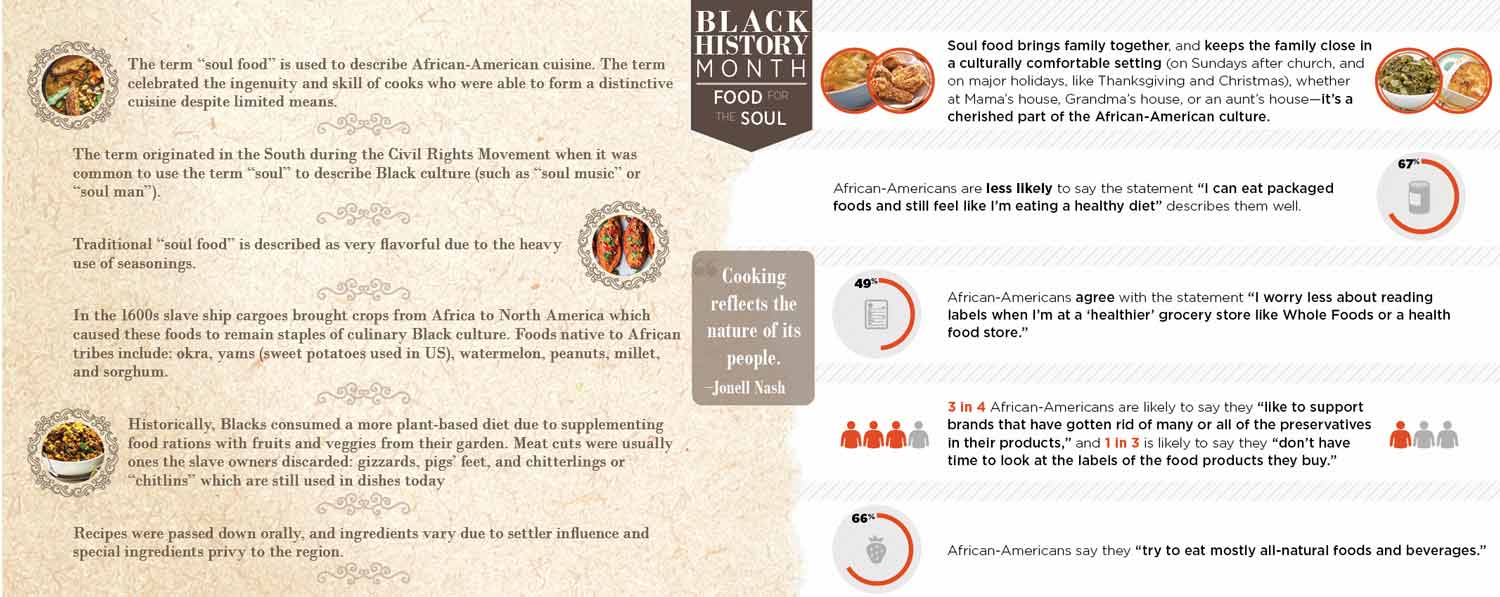
Marketing Insights from Black History Month: A Look at Food and Dining Traditions
Filed Under: Best Practices, Market Research, Black / African American
Ashleigh Williams
Senior Director, Online Qualitative Research
Truth: food brings people together. Luckily for culinary explorers, the love for food is one of those fundamental truths that crosses cultural borders. For researchers and marketers, food and dining practices help paint the picture of who our consumers are because unique cultural cuisine often serves as an indicator of significant past struggles and milestones.
This week, we take a deep dive into Black culture with a focus on food and dining traditions. Food plays a significant role in enriching cultural identity and is a catalyst for Blacks to connect with their values of community and fellowship beyond bloodline relatives.
The Origins of Soul Food
“Soul food,” the cuisine that has been historically associated with Black culture, consists of foods that are metaphorically and intrinsically “made with love” and are timelessly encapsulated within a rich history that traces where Blacks have been, combining the dishes from various African tribal traditions that were brought to the Americas with western European/American ingredients and techniques. The dishes which make up this cuisine are widely regarded as rich, decadent, and wholesome. Soul food has had a profound connection to Southern cuisine as a whole, as many dishes were created by Black cooks in the South. Notable recipes of this cuisine include, among others, foods like okra, greens, yams, and cornbread which celebrate the resourcefulness of Black cooks who used their rations, crops from their gardens, and livestock they hunted to create most of their meals. Bountiful dishes like fried chicken, cakes, pies, and drinks were added during the rise of sharecropping when resources became more plentiful. Curiously, dishes like greens and black-eyed peas are also cooked for superstitious reasons during New Year’s Day (not unlike other cultures) as a sign of wealth and good luck for the coming year.
Later during the Great Migration, Blacks were also influenced by cultures prevalent in the Northern cities they migrated to. Dishes like spaghetti, macaroni, and chili eventually became staples of this cuisine as well.
Sunday Dinner and Black Dining Traditions
Understanding the significance of “soul food” while omitting the dining rituals and traditions it accompanies would be the equivalent of saying ‘I loved the food at that restaurant” by only looking at the menu. One gathering in particular, “The Sunday Dinner” is a beloved event in which the extended family comes together to share in a weekly feast. Traditionally, this dinner is served mid-afternoon after church service in a buffet style with a variety of meats, side dishes, and scrumptious desserts. This dinner can be served at anyone’s home or even within the walls of the church. It is a practice that evolved during weekends when slaves were able to rest from working in the fields and gained access to coveted premium ingredients (like refined flour, and sugar) for their own consumption.
After slavery, church gatherings like holiday dinners and revivals were a way to celebrate milestones and to organize community programs. Other social gatherings, like fish fries or barbeques, are usually communal events that also got their start in association with church gatherings. Today, lavish meals are served and are usually pulled together by church members.
Changing Habits and Evolving Practices
Deliciousness aside, it is widely known that some of these foods and practices don’t necessarily always align with a healthy diet. In fact, according to diabetes.org, non-Hispanic Blacks account for 13.2% of newly diagnosed diabetes cases each year, the second highest group after American Indians/Alaskan Natives. However, mindsets and behaviors are shifting, specifically with Black Millennials who desire to take control of their healthy living habits. This generation values food traditions and incorporating their roots into their daily practices, yet are willing to compromise so that these traditions jibe well with healthy habits that lead to longevity. Therefore, they are employing a variety of techniques and culinary adaptations that provide cultural balance such as monitoring portion control and redefining home-cooked by making healthier ingredient substitutions in traditional dishes.

A recent study by C+R unveiled that a majority of Black Millennials feel it is important to stay up to date with the latest health trends and integrate these within the framework of their traditional culture practices.
“Soul food” is taking on a new identity with some adapting its techniques to new diets or lifestyles like veganism and vegetarianism. Some trends in particular, like the use of coconut and kale super foods, have been long traditions within Black culture but have seen a resurgence due to recent notoriety.
Understanding the background and roots of specific taste preferences and dining behaviors can be beneficial, especially in the CPG space. Marketers can use imagery of these social gatherings as a mirror of the culture to evoke a sense of nostalgia and comfort to draw this group of consumers in. In addition, health does not have to come at the expense of severing ties with cultural traditions.
To learn more about how Black Millennials and Multicultural Millennials healthy lifestyle behaviors are shifting, view the webinar we did on this topic or watch this video where Blacks discuss their food and dining traditions.
Also download our factsheet on this theme and the traditions/rituals that accompany it.
explore featured
Case studies

